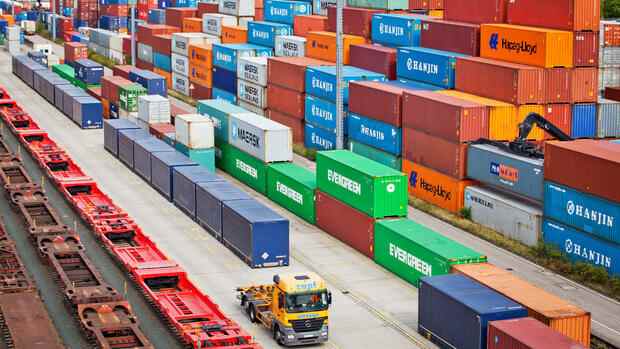ARCHIVE – View of the premises of the DUSS (German transhipment company rail – road) – transhipment terminal Frankfurt/Main-Ost, taken on 08/19/2015 in Frankfurt am Main (Hesse). The site belongs entirely to Deutsche Bahn AG. Photo: Christoph Schmidt/dpa (on the dpa topic package “50 years of containers” from 02.05.2016) +++(c) dpa – Bildfunk+++
(Photo: dpa)
Berlin In the long term, the Russian economy would suffer far more than that of the West if the US and its partners were to sever trade ties with Russia. This is shown by a model by the Kiel Institute for the World Economy (IfW) and the Austrian Economic Research Institute (Wifo).
Russia’s economic output would therefore be almost ten percent lower each year. The damage to the Russian economy would be roughly US$150 billion per year. In western countries, the losses would be just 0.17 percent, which is around 59 times less. “A trade war between Russia and the USA and their allies would hit Russia’s economy hard in the long term,” says IfW trade researcher Alexander Sandkamp.
The researchers used a model that shows how trade flows adjust over the long term when international supply relationships are disrupted. The sanctions imposed were not taken into account in the modeling in order to be able to identify the long-term consequences.
The reason for the unequal distribution of the damage lies primarily in the low economic importance of Russia compared to the USA and its allies. In 2020, for example, the EU was responsible for 37 percent of Russian foreign trade, but conversely only 4.8 percent of the EU’s foreign trade took place with Russia.
Top jobs of the day
Find the best jobs now and
be notified by email.
“A divestment from the Russian economy would be painful for a few sectors, but all in all it would hardly cost us much prosperity in the long term,” explains Michael Hüther, Director of the employer-oriented Institute of German Economics (IW).
China would not benefit noticeably either
As a result of the conflict, Russia could expand its trade with other countries such as China. In 2020, almost 15 percent of Russian exports went to China. However, only around three percent of Chinese imports came from Russia.
Even if Russia now exports more to China, the impact on China should be limited. “The simulation results give an impression of what is at stake for both sides in the long term: After an adjustment phase in world trade, Russia will be significantly weaker,” says Wifo Director Gabriel Felbermayr.
The situation is similar with Russian imports. About 24 percent of Russian imports came from China. At the same time, however, just under two percent of Chinese exports went to Russia. Overall, economic output in China would therefore only increase by 0.02 percent annually in the model. Economically, China would not be the big winner of the crisis.
The German economy is already concerned that the economic relationship with Russia will be broken off. “It is currently less about the sanctions and their consequences, and more about the question of whether we will still have significant economic relations with Russia in the future or not,” said Oliver Hermes, chairman of the Committee on Eastern European Economic Relations. Announcements by companies, also from Germany, that they are giving up their branches in Russia are already increasing these days.
More: These would be the consequences of a complete departure from Russia as an economic partner for Germany

